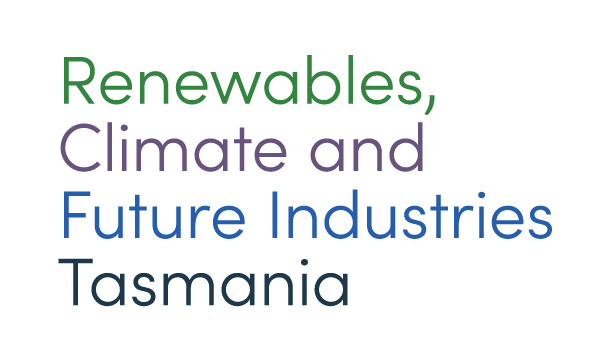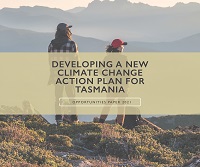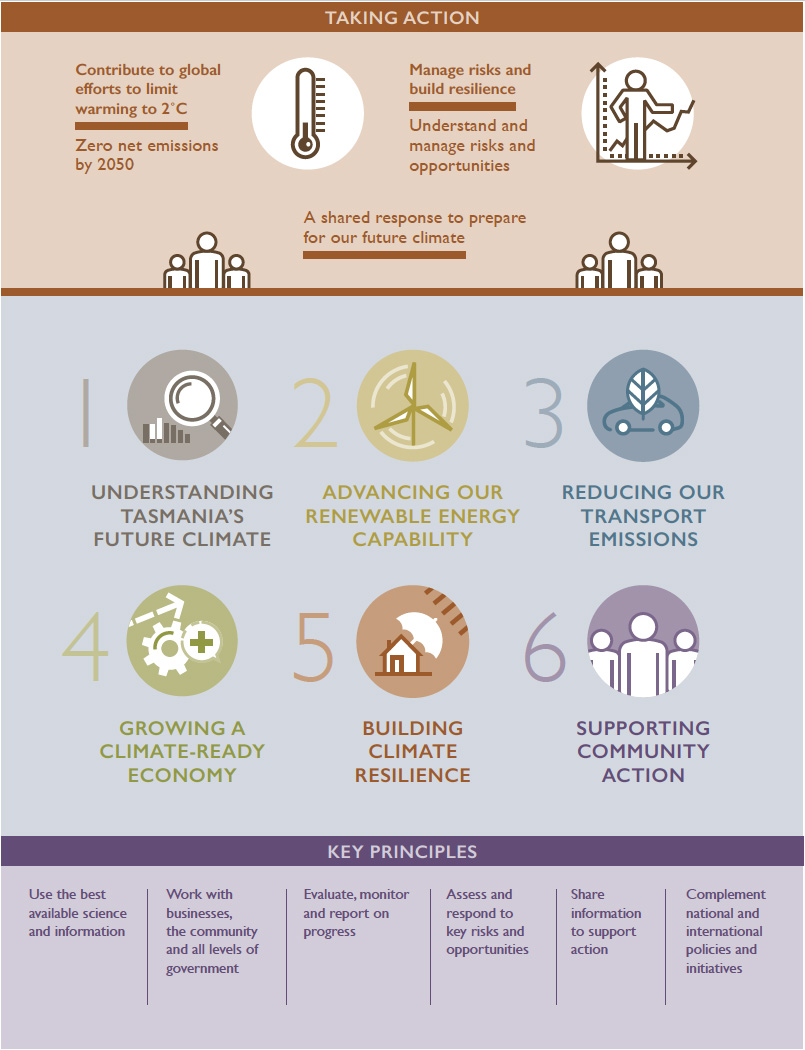
Tasmanian Climate Change Office
- Climate Change Priorities
- Climate change: key facts and figures
- What you can do
- Calendar of events
-
Tasmania's Climate Change Action Plan 2017–2021
- Minister's Foreword
- Our Priorities
- Understanding Tasmania's future climate
- Advancing our renewable energy capability
- Reducing our transport emissions
- Growing a climate-ready economy
- Building climate resilience
- Supporting community action
- Next steps
- Climate change in Tasmania
- List of acronyms and abbreviations
- What We Heard Report - Consult_ext climate change action plan
- Developing a new climate change action plan for Tasmania
- Newsletter
Contact Details
By phone
Find the number of a specific division or office to contact them directly or call Service Tasmania on 1300 135 513.
Our staff
Use the Tasmanian Government Directory to find staff contact details
Social media
Follow our social media accounts to keep up to date with specific programs and initiatives.

Tasmania's Climate Change Action Plan 2017–2021
- Download a copy of Climate Action 21 (PDF)
- Read Climate Action 21 (HTML)
 Climate Action 21 has set the Tasmanian Government’s agenda for action on climate change through to 2021. It reflects the Tasmanian Government's commitment to addressing the critical issue of climate change and articulates how Tasmania will play its role in the global response to climate change.
Climate Action 21 has set the Tasmanian Government’s agenda for action on climate change through to 2021. It reflects the Tasmanian Government's commitment to addressing the critical issue of climate change and articulates how Tasmania will play its role in the global response to climate change.
Developing a new action plan
Tasmania’s current climate change action plan concluded in June 2021. The Tasmanian Government is developing the State's next whole-of-government action plan, which will build on the themes and actions from Climate Action 21. These initiatives will be developed in consultation with the community.
Consultation
Consultation on development of the next action plan began in February and March this year, through a series of one-on-one meetings and public online workshops, followed by the release of the Opportunities Paper and public call for written submissions.
Thank you to everyone who attended an online workshop or provided a written submission to this consultation process.
You can still access the Opportunities Paper:
- Download the print version of the Opportunities Paper (PDF 3MB)
- Read the Opportunities Paper online (web page)
Written submissions
We received 41 submissions in response to the Opportunities Paper. Three submissions were submitted confidentially and will not be published. You can read the public submissions below.
Summary of submissions
We have prepared a summary of the consultation feedback on development of the next action plan.
- Download the What We Heard Consultation Summary Report (PDF 1.7MB)
- Read the What We Heard Consultation Summary Report (webpage)
Consultation with young people
CCYP Ambassadors
As part of the consultation process, the Tasmanian Government facilitated four face-to-face workshops with the Commissioner for Children and Young People (CCYP) Ambassadors, in Devonport, Launceston, and Hobart, and a fifth workshop was held online.
- Download a summary of the CCYP consultation feedback (PDF 1MB)
- Read a summary of the CCYP consultation feedback (webpage)
Tasmanian Youth Climate Leaders
The Tasmanian Government is a proud supporter of the Greening Australia Tasmanian Youth Climate Leaders' Conferences. Climate Change staff attended the conferences to hear their thoughts and ideas about climate change. Watch the Youth Climate Leaders 2021 video.
Reviewing our climate change legislation
At the same time as we develop the next action plan, we are also reviewing our climate change legislation and greenhouse gas emissions reduction target, aiming to strengthen the legislation and set a more ambitious target. The independent review is being conducted by consulting firm Jacobs. Learn more about the legislative review.
Submissions to the Opportunities Paper
While we make every effort to publish items in an accessible format, this is not always possible for documents prepared by others. Some of these submissions may not meet accessibility guidelines.
Organisations
- Action for Climate North West Tasmania (PDF 170KB)
- Australia Institute Tasmania (PDF 2.79MB)
- Bicycle Network Tasmania (PDF 1MB)
- BP Dover (PDF 83KB)
- Break O’Day Council (PDF 165KB)
- Brighton Council (PDF 233KB)
- City of Hobart – Senior Climate Change Officer (PDF 353KB)
- Climate Tasmania (PDF 2.19MB)
- ClimateWorks Australia (PDF 348KB)
- CSIRO (PDF 374KB)
- Doctors for the Environment (PDF 1.47MB)
- Environmental Defenders Office (PDF 283KB)
- Hydro Tasmania (PDF 1MB)
- Launceston Chamber of Commerce (PDF 135KB)
- Local Government Association of Tasmania (LGAT) (PDF 351KB)
- Private Forests Tasmania / Tree Alliance (PDF 354KB)
- Southern Tasmanian Councils Authority (PDF cleared 333KB)
- TasCOSS (PDF 2.32MB)
- Tasmanian Way (PDF 202KB)
- TasNetworks (PDF 963KB)
- The Good Car Company (PDF 379KB)
- University of Tasmania (PDF 4MB)
Individuals
- Clive Attwater (PDF 172KB)
- Stephen Barrett (PDF 83KB)
- Ben & Pen Clark (PDF 98KB)
- Rosemary Farrell (PDF 96KB)
- Tony Heald (PDF 84KB)
- John Hughes (PDF 82KB)
- Casey Mainsbridge (PDF 82KB)
- Ana Navidad (PDF 87KB)
- Roger Proctor & Wendy Fountain (PDF 75KB)
- Andrew Ricketts (PDF 395KB)
- Hannah Sadler (PDF 89KB)
- Dr Clare Smith (PDF 91KB)
- Michael Wadsley (PDF 83KB)
- Penny Wadsley (PDF 85KB)
- David Wanless (PDF 87KB)
- Andrew Wilkie (PDF 843KB)
Climate change commitments
Tasmania is continuing to lead Australia’s transition to a low-emissions economy, demonstrated by our commitment to generate 200 per cent of our energy needs from renewable energy by 2040, and fast tracking a renewable hydrogen industry in Tasmania.
We are on track to deliver our commitment to make Tasmania net renewable energy self-sufficient by the end of 2022, and have met our target of net zero emissions by 2050 five years in a row.
Climate Action 21
The Tasmanian Government committed $3 million to support the delivery of Climate Action 21. This built on over $400 million already invested by the Tasmanian Government to support action on climate change, including a significant investment in irrigation and infrastructure.
Climate Action 21 was prepared in consultation with local government, industry, non-government organisations, research organisations and the broader Tasmanian community. The Tasmanian Government works with these groups in our efforts to reduce emissions and adapt to the impacts of climate change in a way that supports our economy and provides opportunities for growth.
Climate Action 21 includes a commitment to establish an aspirational long-term target to achieve net zero emissions for Tasmania by 2050, which aligns with the Paris Agreement to limit global warming to well below two degrees Celsius above pre-industrial levels.
- Download a copy of Climate Action 21 (PDF)
- Read Climate Action 21 (Accessible HTML)
- Learn more about the Implementation Plan for Climate Action 21
- Read the Climate Action 21 Report Card
Our priorities
Climate Action 21 has 37 actions for the following six priority areas:
- Understanding Tasmania’s future climate commits to providing up-to-date information on climate change projections and impacts, and tailoring this information to support decision making across key industry sectors.
- Advancing our renewable energy capability supports national energy security solutions in the transition to a low carbon generation network and delivers energy efficiency programs with local government, households and businesses.
- Reducing our transport emissions promotes the uptake of electric vehicles and other alternative forms of transport, and optimises the use of vehicles to reduce costs and emissions.
- Growing a climate-ready economy supports businesses and agricultural producers to reduce their emissions, be prepared for the impacts of climate change, and leverage opportunities.
- Building climate resilience enhances our capacity to withstand and recover from extreme weather events, and better understand and manage the risks of a changing climate.
- Supporting community action establishes an aspirational emissions reduction target of zero net emissions by 2050, recognises that all Tasmanians have a role to play in tackling climate change, and assists the community to reduce emissions and energy use.

